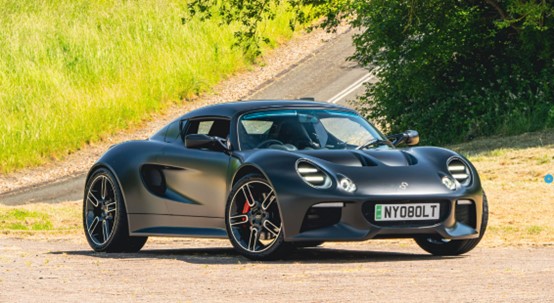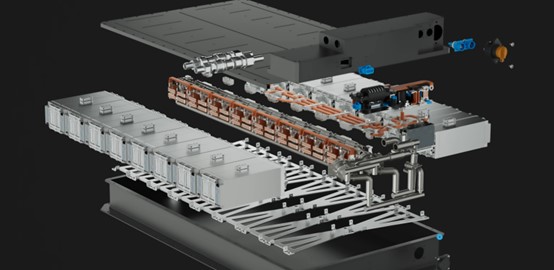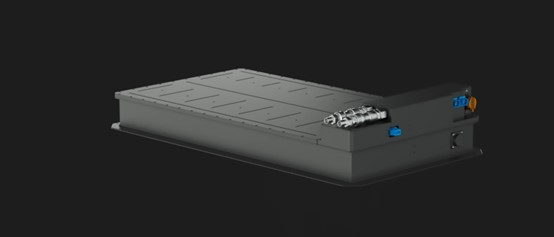Ultra-fast charging niobium-based battery technology provider Nyobolt released the company's first Nyobolt EV prototype electric vehicle that has stepped out of the laboratory on June 28th. This lightweight Nyobolt EV supercar with a weight of only 1.25 tons was designed and manufactured by CALLUM to test the performance of Nyobolt's niobium-based batteries and to demonstrate how niobium-based batteries can enhance the charging speed and customer experience of electric vehicles.

Nyobolt, founded in 2019 and headquartered in Cambridge, UK, uses patented carbon and metal oxide anode materials, innovative low-impedance battery design, integrated power electronics, and software control to create high-power, high-energy-density batteries, and fast-charging systems. This battery technology can be applied to the electrification of industry and automotive, such as heavy-duty off-road trucks, electric vehicles, robots, and consumer devices that require high power and fast charging cycles.

Preliminary vehicle tests conducted by the company using a 350kW (800V) DC fast charger confirmed that the 50Ah 35kWh battery on the Nyobolt EV can be charged from 10% to 80% in 4 minutes and 37 seconds, and the prototype can achieve a range of 155 WLTP miles after a full charge. This is twice the speed of most of the fastest charging vehicles today. Additionally, due to a constant current of 500A for the first four minutes, just four minutes of charging can provide a range of 120 miles.
Nyobolt's technology also solves the degradation issues that are usually associated with the boosting of lithium-ion batteries. The company claims that Nyobolt's 24.5Ah battery has successfully completed more than 4,000 full DoD (depth of discharge) fast charging cycles, which would be equivalent to over 600,000 miles if used in a Nyobolt EV battery pack, while still retaining over 80% of its battery capacity. This is many times higher than the warranties of larger electric vehicle batteries on the road today.
The company also stated that after testing by some third-party car manufacturers, the Nyobolt 2.6Ah battery can achieve more than 4,400 cycles at 23°C with a charge rate of 12C and a discharge rate of 1C. Moreover, after 4,400 five-minute charging cycles, the internal resistance of the battery only increased by 50%. This is below the industry's recognized scrap value for electric vehicle batteries, which is usually twice the initial value.
Although some original equipment manufacturers' charging times are around 15 minutes, a closer look reveals that charging usually spans a limited SOC area, specifically chosen to limit the battery's lifespan, such as between 20-80%. Typically, the charging profile will only maintain these peak charging levels for a very short charging time. Nyobolt's low-impedance batteries ensure sustainability, and in the company's published technical demonstrations, the battery's lifespan can be extended to 600,000 miles.
Dr. Sai Shivareddy, co-founder and CEO of Nyobolt, said that the 35kWh battery pack in the Nyobolt EV prototype not only increases range but also the compact size of the battery pack can make the purchase and operation cost of electric vehicles lower, and manufacturing consumes fewer resources.
Although the primary use of this Nyobolt EV is to showcase and test battery technology, the CALLUM team has designed it for small-scale production - for road or track use. Nyobolt's battery assembly plan is more advanced and may be produced in small batches within a year, increasing to 1,000 battery packs by 2025.
Nyobolt also stated that once mass production begins, its flexible manufacturing model can achieve an annual output of up to two million cells.

The architecture of the Nyobolt EV also emphasizes how it can be retrofitted to existing electric vehicle platforms, bringing significant changes in charging time and battery cycle life. The battery modules of the Nyobolt EV are cooled by a cold plate with a water/glycol mixture. The battery circuit uses an AC compressor and condenser as well as a battery cooler, which is compatible with other high-performance vehicles and produces nearly standard modules and battery packs. Limited heat generation (not exceeding 60°C during fast charging or performance driving) is mainly influenced by the ultra-low impedance battery chemistry.
Nyobolt also said that it has been in communication with eight other car manufacturers about adopting its technology. In addition to being applied to the automotive field, Nyobolt's fast-charging technology will also be deployed in robotics this year, and it is continuously advancing applications in other fields, such as the heavy commercial vehicle field that requires low downtime and high productivity.
Nyobolt's technology is based on ten years of battery research led by Professor Clare Grey CBE, a battery scientist at the University of Cambridge, and Dr. Sai Shivareddy, who invented advanced supercapacitors. Nyobolt has exclusive intellectual property rights to the original niobium-based anode invention by Professor Clare Gray, which can provide ultra-fast charging without affecting the battery life. The key is its low-impedance battery that generates less heat, making it easier to manage such high power levels during the charging process. The niobium-based anode materials used in lithium-ion batteries allow electrons to transfer more quickly between the anode and cathode.
In a paper published by Clare Gray and her research team in Nature in 2018, two complex niobium tungsten oxides - Nb16W5O55 and Nb18W16O93, with crystallographic shear and bronze-like structures, respectively, can intercalate a large amount of lithium at high rates even when the niobium tungsten oxide particles are at the micrometer scale. Measurements of the lithium-ion diffusion coefficients in both structures show that the room temperature values are several orders of magnitude higher than the room temperature values in typical electrode materials such as Li4Ti5O12 and LiMn2O4.
Professor Clare Gray, a battery scientist, said in an interview at the time:
"In this work, we broke the traditional electrode material nanoscale and nanostructure strategies to overcome poor ion diffusion and electronic performance (such as TiO2 and Li4Ti5O12). We have demonstrated that with the appropriate host lattice, the usual size, structure, or porosity criteria are not needed to achieve practical high-rate battery electrodes.
Instead, we used insights gained from previous studies on complex binary niobium oxides, such as low-temperature polytypic T-Nb2O5, and superionic conductors such as lithium lanthanum titanate perovskite (LLTO), to identify structural motifs that should exhibit favorable lithium diffusion characteristics, resulting in outstanding performance, allowing the use of micrometer-sized particles at extremely high rates. We have shown that when poly-redox 4d and 5d transition metals are used with appropriate three-dimensional oxide structures, we can achieve extremely high volumetric energy density and impressive rates."
This British ultra-fast charging niobium-based battery technology developer received support from Microsoft investor and former DuPont CEO Marc Doyle and leading technology investors William and Andy Matthes at the beginning of 2021, completing a $10 million Series A round of financing, and subsequently opened an office in Boston, USA. The company's entrepreneurial team comes from companies such as Lotus, Tesla, Samsung, and Dyson. The company currently has operations in the UK, the US, and Asia.
Paper: Griffith, K.J., Wiaderek, K.M., Cibin, G. et al. (2018) "Niobium tungsten oxides for high-rate lithium-ion energy storage." Nature 559, 556–563 doi: 10.1038/s41586-018-0347-0








